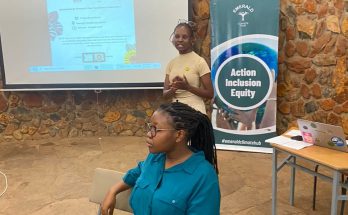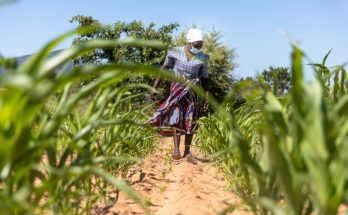
By Nesia Mhaka
Youths in rural areas have been advised to consider venturing into green businesses, as a way of cushioning themselves from economic challenges.
Green jobs are decent jobs that contribute towards the preservation and restoration of the environment.
They help to reduce consumption of energy and raw materials, limit greenhouse gas emissions, minimise waste and pollution, protect and restores ecosystems while also supporting adaptation to climate change.
Green jobs are also the response to two major challenges of today on how to deal with climate change and environmental degradation, and how to deliver development and decent work.
They also have the ability to help lift millions of youths out of poverty while promoting social inclusion.
The Ministry of Environment, Climate, Tourism and Hospitality lndustry in partnership with Africa Youth Initiative on Climate Change have developed the project titled ‘Strengthening Learning and Skills Development to Address Climate Change’ to capacitate rural and youth groups on climate change impacts and action nation-wide.
The project was being funded by United Nations Climate Change Learning Partnership through the United Nations Development Programme and ACT Alliance as the core funder.
Many youths in Zimbabwe hardly venture into green businesses or agri-business as a form of employment since it entails manual work and unpredictable climatic conditions making it a risky undertaking.
Zimbabwe is one of the fore front countries in urging the youth to engage in green business by rolling out various programmes that encourage them to adopt modern and sustainable forms of business.
“It was high time for youths in the country to have a paradigm shift and stop being perennial job seekers when they could be their own employers through developing green jobs.”
This was said by the Ministry of Environment, Climate, Tourism and Hospitality Industry, Climate Change expert Mr Tatenda Mutasa at the Strengthening Learning and Skills Development to address climate change capacity building workshop in Mt Darwin last week.
“I think this tendency of looking for employment after one has completed his or her studies no longer works these days.
“Many companies are struggling even to pay those workers that they have and to imagine that they will employ more workers would be tantamount to building castles in the air.
“We want our youth to be at the forefront of job creation by being innovators and entrepreneurs,” he added.
Mr Mutasa further called on the youth to venture into agriculture income generating projects and create more employment saying that agribusiness has become a lucrative business in the developed economies.
“If we don’t show confidence in our young people, who will do it? A lot of banks such as Zimbabwe Women’s Bank are committed to creating a good financing vehicle to support young entrepreneurs and innovators.
“Entrepreneurship, job creation, among young people hold the key to address high levels of unemployment which would reduce poverty and accelerate national economic growth,” he said.
Speaking at the same event, Africa Youth Initiative on Climate Change project manager Ms Elizabeth Gulugulu said entrepreneurship and innovation among the youth is an engine of social and economic transformation of the country which should be harnessed.
“I encourage young people in here to work hard and turn their entrepreneurial dreams into working businesses,” she said.
She urged fellow youths to venture into agricultural activities to significantly contribute to the growth of the country’s economy, arguing that most youth prefer to work in an office environment rather than in the fields.
“Youths have the perception that agriculture is for old people but this has changed with the coming of technology and smart agriculture; you do not need to get your hands dirty,” she said.
Ms Gulugulu added that there is need for youth to venture into self-employment such as agriculture, which she described as lucrative.
She said venturing into agriculture will help to close the unemployment gap in most countries in Southern African.
“Young people should change and stop looking only for formal jobs to reduce the unemployment levels in the country and become more productive and contribute to the growth of the economy,” she said.
She also urged youths venturing into agriculture to join agricultural organisations and learn about innovations and opportunities in the sector to boost their productivity.
Beauty Muchando, a youth in Ward 16 in Murehwa district challenged organisations responsible for youths’ development to provide a networking platform where youths can share their experiences on their involvement in green businesses.
She called on banks to also come up with products to support youth farmers to have easy access to finance.
“Lack of skills (numeracy and literacy), entrepreneurial acumen and lack of technical know-how on modern farming techniques remain staggering blocks that keep us young people from exploring enterprise development in agriculture, related value chains and ultimately, creation of green jobs.
“Access to capital on the one hand, the youth lack the required assets to secure credit and are perceived as ‘high risk and not creditworthy’ by a majority of lending institutions.
“On the other hand, she said, rural young women particularly face gender stereotyping in relation to land ownership, access to credit and many have low levels of education that reduce their competitive entry and market expansion of their enterprises.”
She added that the perception that agriculture is for ‘old folks’ and a lack of exposure to off-farm and on-farm opportunities in agri-business has hindered young people from pursuing opportunities in the sector.



